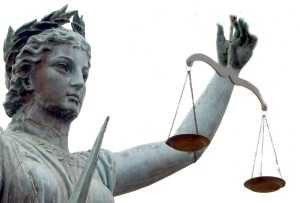Last week, John and I were in Arizona for a meeting of the American College of Trial Lawyers. We were fortunate to get to hear a number of great speakers including FBI Director Christopher Wray who left us all assured the Bureau was in good hands, and Professor Goodwin who opened our eyes to the collateral damage of the so-called War on Drugs. But the two speakers we enjoyed most were: John Q. Barrett, the author of Justice Robert H. Jackson, Trial Lawyer at Nuremburg and Jason Schechterle, a retired Arizona police officer who was horribly burned from an on-duty accident but displayed a resilience and optimism that few can imagine let alone embrace. While these two speakers and their topics were incredibly different, both had a similar underlying message: the work that trial lawyers do is incredibly important
First, there was Justice Jackson, a rock-star of a trial lawyer who served as both Solicitor General and Attorney General for the United States before joining the United States Supreme Court where he authored many important decisions including Brown v. Board of Education. While serving on the United States Supreme Court, he was tapped by President Harry Truman to be the lead prosecutor for the United States in the Nuremburg trials. Of course, he already had a day job but he agreed since the trials were scheduled during the Court’s summer hiatus. While Russia thought the Nazi war criminals should simply be shot, Justice Jackson insisted on the rule of law by advocating the war criminals be tried with all the rights that due process required. Justice Jackson eloquently stated: “That four great nations, flushed with victory and stung with injury, stay the hand of vengeance, and voluntarily submit their captive enemies to the judgment of the law is one of the most significant tributes that Power has ever paid to Reason.” At the conclusion of the trials, 19 of the 22 war criminals were convicted. Initially, Jackson was chagrined by the three acquitals but quickly embraced them as proof that the rule of law had prevailed.
Then came the story of Jason Schechterle. While on duty as a Phoenix, Arizona police officer, he was rear-ended by a taxi traveling at roughly 100 mph. Officer Schechterle’s Ford Crown Victoria cruiser exploded into flames. As he described it, he was “lucky” that day because a firetruck was parked roughly one block away. The firefighters extricated him within 90 seconds but the enferno was so hot he still sustained 4th degree burns on his face and torso. (yes, there is such a thing as 4th degree burns). Officer Schechterle’s “luck” continued as he was close to an excellent hospital and was on a trauma table within 8 minutes of the impact. While his unimaginable injuries took so much from him that day, he retained his sense of humor and purpose.
The taxi driver who hit Officer Schechterle was experiencing an epileptic seizure at the time of the accident. At first blush, that fact appeared to absolve him of any wrong-doing. Yet, it was established that he knew of his condition and was not appropriately taking his medicine and had previously been involved in some other minor accidents as a result of his condition. Moreover, trial lawyers were able to prove the Ford Crown Victoria was defective in that the placement of the gas tank made it especially susceptible to fire explosions. In fact, dozens of officers were seriously injured or killed in similar fiery crashes. The work performed by trial lawyers in Officer Schechterle’s case and others caused Ford to make changes.
Trial work can be draining and stressful but the speakers we heard in Arizona left us with a renewed sense that our work is incredibly important to both families and the rule of law.
 Tennessee Injury Law Center
Tennessee Injury Law Center


